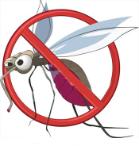The Dirt Doctor, Howard Garrett's Newsletter on Mosquito Control

Here is information from The Dirt Doctor, Howard Garrett’s Newsletter on mosquito control. It does not have to be dangerous. We all know that Greyhounds need to be protected from mosquitoes with monthly medications, but this is also helpful to humans as well.
Here's the update on the Dirt Doctor’s recommended program:
1. Empty standing water where possible. Even small containers such as pot saucers, old tires, soda bottles and cans hold enough water for mosquito breeding.
2. Treat water that cannot be emptied with gambusia fish or (Bti - Bacillus thuringiensis ‘Israelensis’) products such as Bactimos Briquettes or Mosquito Dunks.
3. Spray to kill adult mosquitoes with "essential oil" plant oil pesticides such as Avenger Natural Insect Control, EarthHarvest, or Eco-EXEMPT. Garlic oil sprays work well to repel the insects for up to 20 days. Even better, broadcast dry garlic to the site at 1 - 2 pounds per 1000 square feet. Dr. T’s Mosquito Repellent is another good dry product but Bonide Mosquito Beater Granules are more cost effective and work better.
4. Use organic landscape management to encourage birds, bats, fish, dragonflies and other beneficial insects.
5. Use skin repellents that contain natural repellent herbs such as aloe vera, eucalyptus, tea tree oil, lavender, vanilla, citronella and other helpful herbs, but avoid the dangerous DEET products.
Commercial
Mosquito Control
Besides
being a summer nuisance, mosquitoes pose some public health problems,
carrying such deadly agents as malaria, yellow fever and West Nile virus.
However, conventional pesticide application is often less than effective in
controlling mosquito larvae before they hatch and repeated use of toxic
materials has raised various environmental and health concerns.
West Nile Virus is the most overblown health threat since the “killer bees.” Yes, people have gotten sick and some have even died from West Nile Virus, but people need to put things into perspective. Very few have died from West Nile Virus while thousands die annually from asthma and other respiratory diseases.
Be aware of what your city is spraying for mosquitoes. Toxic spraying does more harm than good. Cities across the country have been foolish and have listened to the chemical pushers under the misconception that spraying toxic chemicals is helpful in controlling the mosquitoes. Spraying toxic chemical pesticides, known generically as synthetic pyrethroids, has been the primary recommendation. Besides being toxic, this procedure doesn’t work. An adult mosquito spray program conducted late at night, as is usually done, misses the primary activity time of the pests. It also sprays or fogs down streets primarily affecting front yards of residential property. Most mosquito problems are in back yards. When these airborne toxins reach water features, ponds and creeks, a common result is the death of fish including goldfish and koi.
The risk of getting West Nile virus is remote. A very small percentage of mosquitoes have the virus, an even smaller percentage of people exposed to the virus develop symptoms and a minute percentage of those people even get sick. Spraying toxic chemicals for the control of mosquitoes is a waste of money and an unnecessary assault on people, pets and the environment – plus it simply doesn’t work. There are very few adult mosquitoes flying around early in the morning when the spraying is done plus there is good argument that the spraying actually increases the mosquito problem by killing beneficial insects such as dragonflies that help control mosquitoes.
Synthetic pyrethroids like Scourge (resmethrin) are particularly hard on people with asthma and other allergies. These toxic products now contain piperonyl butoxide (PBO), a synthetic synergist that interferes with the insect’s system of neutralizing toxins. PBO makes the pesticide more effective at killing the targeted pest, but the override of the body’s detox system is also a concern for all other animals including birds, lizards, toads, frogs, beneficial insects, pets and humans. MSDS sheets (Material Safety Data Sheets) on these products from the pesticide manufactures point out that liver tumor increases in test animals has been significant. Of course, they claim that humans aren’t in danger.
Rational, effective control of mosquitoes results from removing or treating stagnant water with biological products, horticultural oils or gambusia fish and wearing non-toxic repellents on the skin.
If spraying the air to try to repel or kill adult biting mosquitoes is required, there are highly effective non-toxic alternatives, such as several brands of essential oil products.
Cinnamon
oil kills mosquitoes
Cinnamon
oil shows promise as a great-smelling, environmentally friendly pesticide, with
the ability to kill mosquito larvae, according to a new study published in the
July 14 issue of the Journal of Agricultural and Food Chemistry. The
researchers also expect that cinnamon oil could be a good mosquito
repellant.
Vanilla
Vanilla home remedy:
8 oz water
2 tsp vanilla extract
1 tsp. orange oil
Spray or dab on liberally
Some gardeners have recommended vanilla hand/body lotion. Watkins Vanilla hand/body lotion is available at most retail stores.
Ask for
products in your Independent Garden Center. Shop for products I
recommend in the Natural Organic Warehouse
(NOW). You can
also read and learn more in my new book Organic
Manual for the Professional.
If you
have any questions on this newsletter or any other topic, tune in Sunday 8am
-11am (CST) to the Dirt Doctor
Radio Show. The
phone number for the show is 1-866-444-3478.
Listen on the internet or find a station in
your area. Organic
Club of America Members can log in on Sunday mornings to see the
Dirt Doctor's Live Broadcast.
Please share this newsletter with everyone in your address book and all of your friends on Facebook and Twitter to help me spread the word on organics.
Naturally
yours,
Howard
Garrett

Texas Adopt a Greyhound Society, Inc. ~ P.O. Box 703782 ~ Dallas, TX 75370
214-368-TAGS(8247) or 855-TAG-TAGS (824-8247)